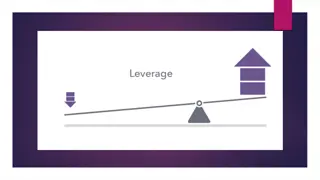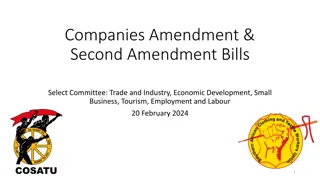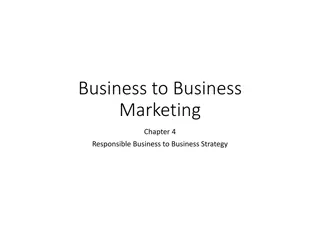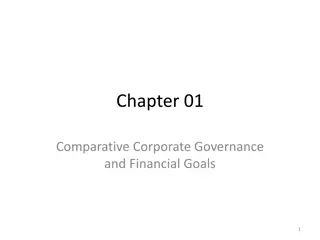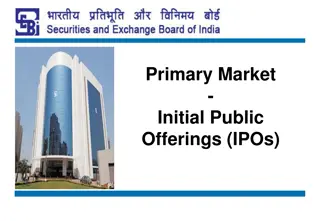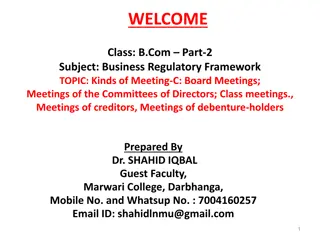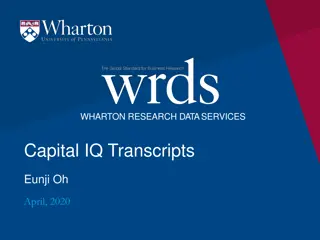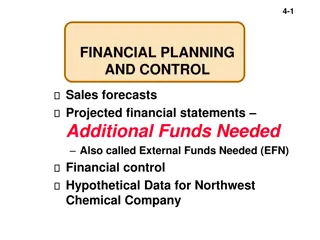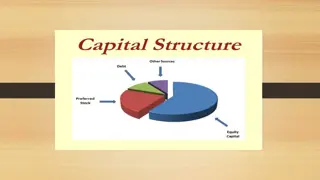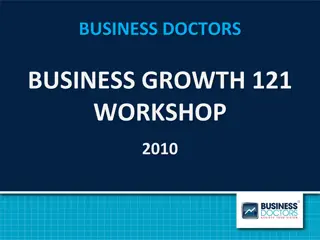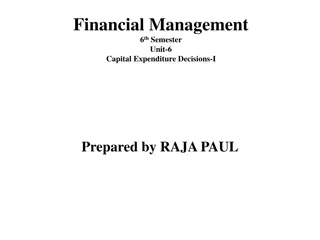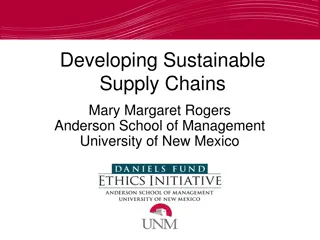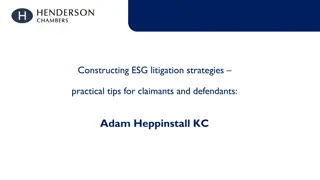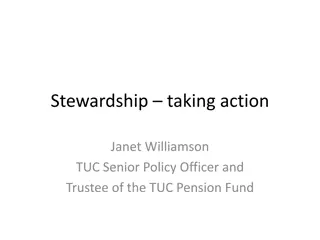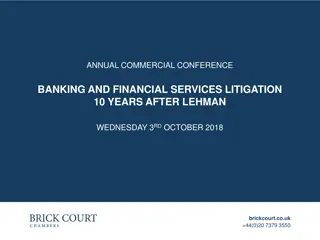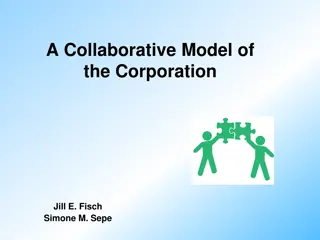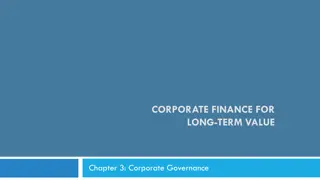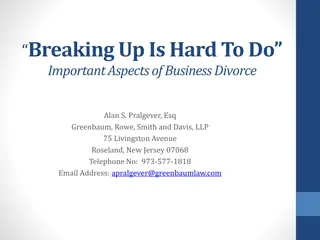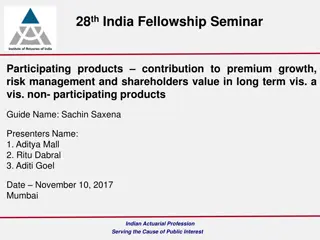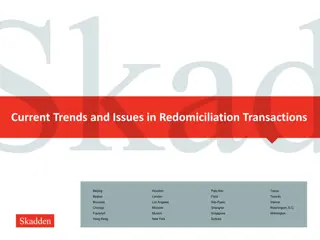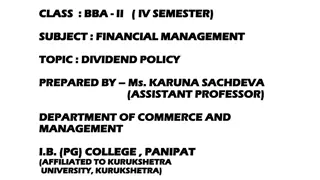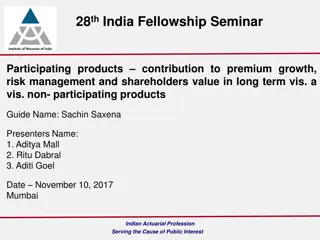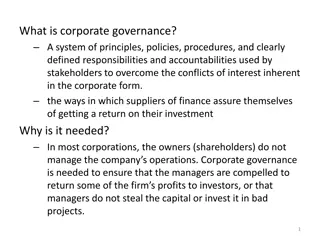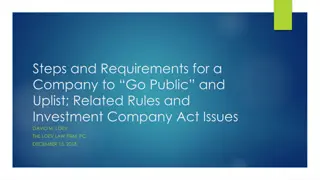Is the U.S Approaching Another Regional Bank Crisis
The U.S. Regional Bank Sector is under scrutiny amid concerns of a potential crisis, notably highlighted by New York Community Bancorp's (NYCB) recent challenges. NYCB's stock hit a 27-year low following revelations of undisclosed credit loss provisions, leading to shareholder lawsuits.
2 views • 7 slides
Capital Structure
An appropriate capital structure aims to maximize shareholder return, minimize financial risk, provide flexibility, ensure debt capacity is not exceeded, and maintain shareholder control. The optimum capital structure achieves a balance of equity and debt to maximize firm value.
1 views • 5 slides
Understanding Leverage and Operating Leverage in Financial Management
Leverage in financial management refers to using assets or funds with fixed costs to analyze the impact of debt and equity mix on shareholder returns and risk. Operating leverage focuses on leveraging fixed operating costs to amplify profit changes with sales variations, measured by the degree of op
2 views • 6 slides
Challenges and Negotiations Surrounding Companies Amendment Bills
The Select Committee on Trade and Industry addressed issues such as outdated legislation affecting South Africa's business environment. Negotiations at Nedlac resulted in compromises between business and labor interests. Criticisms were raised regarding corporate transparency, executive pay discrepa
0 views • 17 slides
Zoya Food Industry PLC - Creating Delicious Snacks in East Africa
Zoya Food Industry PLC is a company based in Pakistan and Ethiopia, specializing in the processing, manufacturing, and sale of Bubble Gums and Snacks under various brand names. With a focus on creating great-tasting, healthy, and organic snacks, the company aims to provide superior products and serv
1 views • 7 slides
Business to Business Marketing
Exploring the significance of corporate social responsibility, sustainability, and ethical frameworks in B2B strategic decision-making. Understanding shareholder, customer, supplier, and relationship values in business marketing strategy formulation. Differentiating between formal planned strategy a
6 views • 13 slides
Buyback of Shares in India under Companies Act & Tax Consideration
Explore the intricacies of share buybacks in India, from regulatory compliance under the Companies Act to tax considerations under the Income-tax Act. Discover how companies navigate legal frameworks to optimize surplus cash, enhance shareholder value, and strengthen promoter holdings through strate
6 views • 4 slides
Comparative Corporate Governance and Financial Goals in Multinational Business
Understanding the dynamics of Comparative Corporate Governance and Financial Goals in Multinational Enterprises (MNEs), exploring the significance of Shareholder Wealth Maximization, Stakeholder Capitalism, and the impact of cultural, governance, and financial differences on global financial managem
0 views • 20 slides
Financial Impacts of Electric Vehicles on Utility Ratepayers and Shareholders
Analysis funded by the U.S. Department of Energy examines the effects of electric vehicle adoption on utility finances, including ratepayer and shareholder impacts. The study delves into customer EV adoption, utility revenue collection, and investment value. Various charging strategies and utility c
0 views • 21 slides
Understanding Employee Engagement and its Impact on Workplace Performance
Employee engagement is crucial for organizational success as it reflects the emotional connection employees have with their work. It involves high levels of energy, dedication, and absorption at work, leading to enhanced productivity, performance, and a positive work environment. Engaged employees a
2 views • 34 slides
Understanding IPOs and the Primary Market
Explore the world of Initial Public Offerings (IPOs) in the primary market, covering topics such as application processes, shareholder rights, price discovery, and more. Learn about the objectives of the primary market, types of issuers and issues, utilization of funds, and the difference between pr
0 views • 49 slides
Understanding Different Types of Business Meetings in Corporate Governance
Directors of a company hold board meetings to exercise powers and functions efficiently. These meetings ensure effective supervision of the company. Board meeting procedures, quorum requirements, and delegation of powers to committees of directors are discussed. Class meetings for specific sharehold
0 views • 8 slides
Understanding Internal Reconstruction in Companies
Internal reconstruction in companies involves reorganizing the financial position without liquidation or forming a new entity. It aims to enhance profitability by aligning assets with true values. Methods include altering share capital, changing shareholder rights, and compromising with creditors. N
0 views • 19 slides
Overview of Capital IQ Transcripts: Data Collection and Coverage
The Capital IQ Transcripts package by Wharton Research Data Services provides historical conference call transcripts for approximately 8,000 public companies worldwide, covering various call types including earnings calls, shareholder/analyst calls, M&A calls, and more. The data collection process i
1 views • 15 slides
Financial Planning and Control in Business
Financial planning involves projecting sales, income, and assets to determine the resources needed to achieve goals. Financial control focuses on implementing plans, receiving feedback, and making adjustments. Growth should not be the sole goal; shareholder value creation is key. The percentage of s
0 views • 27 slides
Understanding Ratio Analysis in Financial Statements
Ratio analysis is a crucial process in interpreting financial statements by deriving accounting ratios from the balance sheet and profit and loss account. It involves assessing short-term liquidity, long-term solvency, activity ratios, and profitability ratios. Liquidity ratios like current ratio, q
2 views • 41 slides
Features of an Appropriate Capital Structure and Optimum Capital Structure
While developing a suitable capital structure, the financial manager aims to maximize the long-term market price of equity shares. An appropriate capital structure should focus on maximizing returns to shareholders, minimizing financial insolvency risk, maintaining flexibility, ensuring the company
3 views • 5 slides
FPC Annual General Meeting & Shareholder Information Session Summary
The FPC Annual General Meeting featured introductory remarks by Chairman Mr. Michael Gallagher, followed by formal business resolutions and a shareholder information session by Mr. Angus Geddes. Key resolutions included the adoption of the Remuneration Report and the re-election of Director Mr. Mich
0 views • 26 slides
Understanding Dividend Policy and Share Repurchase in Corporate Finance
Firms in corporate finance make decisions on dividend payouts and share repurchases, impacting company value and shareholder returns. Dividends are payments to shareholders, while share repurchases involve buying back company stock. Companies can choose between these methods based on various factors
1 views • 29 slides
Business Doctors: Workshop on Business Growth Strategies
Explore the transformative workshop on business growth strategies by Business Doctors. Learn to work on your business effectively, setting clear goals, strategies, and action plans. Understand the importance of personal drivers, core values, and market knowledge for business success. Elevate your bu
0 views • 45 slides
Understanding Capital Expenditure Decisions in Financial Management
Capital expenditure decisions involve evaluating long-term investment projects in assets like buildings and machinery to maximize shareholder wealth. This process is crucial for businesses as it helps in increasing output, reducing costs, and providing contemporary goods to meet customer demands, ul
0 views • 16 slides
Disclosure Slide Templates for ACCME/ANCC Accredited Conferences
These disclosure slides are designed for presentations at ACCME/ANCC Accredited Conferences. They include templates for disclosing conflicts of interest, grant/research support, speaker bureau affiliations, consultant roles, major shareholder status, off-label medication discussions, and more. Use t
1 views • 4 slides
The Evolving Role of the Modern Corporate Secretary
The role of corporate secretaries has evolved significantly, from being mere clerks to now actively making representations, entering contracts, and playing crucial roles in company operations. This evolution is reflected in modern Companies Acts and the day-to-day business operations. Corporate secr
0 views • 11 slides
Sustainability in Supply Chain Management: Key Considerations and Benefits
Sustainable supply chain management is crucial for meeting sustainability criteria while staying competitive and addressing customer needs. It encompasses activities from raw materials to end-users, impacting aspects like product design, recycling, risk management, and shareholder value. By promotin
0 views • 20 slides
Practical Tips for ESG Litigation Strategies: Claimants and Defendants
Learn about constructing effective ESG litigation strategies with practical tips for both claimants and defendants. Explore topics such as what ESG litigation entails, jurisdiction issues, and examples of ESG litigation cases. Understand the formats for group actions and shareholder actions, along w
0 views • 14 slides
Union Stewardship in Shareholder Engagement
Janet Williamson, TUC Senior Policy Officer and Trustee of the TUC Pension Fund, emphasizes the importance of stewardship in public debate and policy. The Stewardship Code principles include public disclosure, conflict management, monitoring investee companies, and collective action. Increased union
0 views • 13 slides
Recent Developments in Shareholder Claims and Legal Issues
Explore the latest insights on shareholder claims and legal issues in the banking and financial services sector, including significant litigation cases and key considerations regarding causes of action, reflective loss, procedural routes, and privilege challenges. Stay informed about important judgm
1 views • 86 slides
Legal Rights and Obligations Regarding Shareholder Meetings
This content discusses the rights and obligations related to shareholder meetings in a legal context. It covers topics such as the chairman's authority to call special meetings, shareholders' voting rights, and the secretary's obligation to provide notice for meetings. The comparison between optiona
0 views • 28 slides
Enhancing Corporate Value Through Insider-Shareholder Collaboration
This study delves into two contrasting models of the corporation - confrontational versus collaborative. It explores how collaboration between insiders and shareholders can lead to increased economic value for the firm, drawing on examples and insights from corporate law, private ordering, and game
0 views • 16 slides
Corporate Governance: Key Concepts and Models
Corporate governance explores mechanisms guiding company control and direction, addressing information asymmetry and agency problems. The shareholder model emphasizes conflicts between owners and managers, while the stakeholder model advocates balancing interests for long-term value creation. Divers
0 views • 20 slides
Maximizing Shareholder Value Creation Through Strategic Business Practices
Explore the concept of shareholder value creation, the importance of generating revenues exceeding economic costs, and meeting shareholders' expectations. Learn about Economic Value Added (EVA), key value drivers, aligning strategy with value creation, and essential factors for overall business succ
0 views • 11 slides
Rethinking Firm Governance Through Property Rights and Stakeholder Theory
Challenging the traditional shareholder-centric view, this study explores how property rights theory and stakeholder theory can offer a more comprehensive perspective on firm governance. It delves into the complexities of value creation, contractual relationships, and diverse stakeholder interests,
0 views • 10 slides
Understanding the New Jersey Oppressed Shareholder Statute
The New Jersey Oppressed Shareholder Statute, N.J.S.A. 14A:12-7, outlines the grounds for oppression in a corporation and the process for a buyout. It allows the Superior Court to appoint a custodian, provisional director, order stock sale, or dissolve the company. Key provisions include shareholder
0 views • 12 slides
India Fellowship Seminar on Participating vs. Non-participating Products
The seminar delved into the role of participating and non-participating insurance products in premium growth, risk management, and creating shareholder value in the long term. It discussed market trends, historical data, and key drivers influencing shareholder value in the Indian insurance industry.
0 views • 21 slides
Overview of Redomiciliation Transactions and Section 7874 Implications
Section 7874 imposes restrictions on domestic corporations becoming owned by foreign entities with the same or similar shareholder base. It outlines tests triggering adverse consequences and discusses self-inversion transactions, tax considerations, and cross-border combinations. Notably, substantia
0 views • 8 slides
Understanding Dividend Policy in Financial Management
Dividend policy plays a critical role in balancing long-term financing and shareholder wealth. It involves determining the distribution of profits among shareholders while retaining earnings for company growth. Approaches like Long Term Financing and Wealth Maximisation influence dividend decisions,
0 views • 24 slides
Updates on Nonprofit Financial Statements and Net Assets
Stacy Smith, a CPA Shareholder at Mize Houser & Company, discusses key changes in nonprofit financial statements brought about by ASU 2016-14. The update includes improvements in presenting operating cash flows, net asset classes, liquidity information, expense reporting, and investment return. The
0 views • 32 slides
India Fellowship Seminar: Product Contributions to Growth, Risk Management, and Shareholder Value
India Fellowship Seminar discussed the contributions of participating and non-participating products to premium growth, risk management, and shareholder value. Key topics included market trends, drivers of shareholder value, PAR vs NPAR attractions, creating shareholder value, and risk management st
0 views • 21 slides
Understanding Corporate Governance: Principles, Objectives, and Duties
Corporate governance is a system of principles and practices used to manage conflicts of interest in corporations. It ensures managers act in the best interest of shareholders. Key aspects include objectives to mitigate conflicts, ensure efficient asset use, and common sources of conflict like manag
0 views • 10 slides
Guide to Going Public and Uplisting for Companies
This guide outlines the steps and requirements for a company to go public and uplist, including SEC filings, shareholder requirements, and compliance with the Investment Company Act. It also covers the use of subsidiary entities to shield liability. Disclaimer: Information provided for informational
0 views • 48 slides


